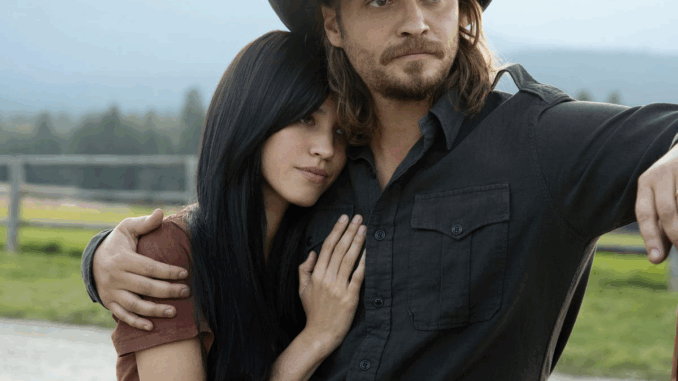
1. Who Is Kelsey Asbille?
Born in 1991, Kelsey Asbille (formerly Kelsey Chow) built her career with roles in One Tree Hill, Wind River, and of course, Yellowstone. She’s of Chinese and British descent and has publicly claimed Cherokee heritage—a claim that became central to the controversy.
2. The Cherokee Claim
In interviews, Asbille described herself as part Cherokee, saying that playing Indigenous roles felt natural and personal. She has been introduced in media as having Eastern Band Cherokee roots, despite not being raised in a Native community.
3. Tribal Records Tell a Different Story
The Eastern Band of Cherokee Indians’ Tribal Enrollment Office has confirmed there’s no documentation to verify that Asbille is an enrolled member or direct descendant. This formal statement put her claim under the spotlight.
4. Native Actors Speak Out
Prominent Native actors, including Adam Beach, openly criticized the casting choice, urging a boycott of productions that overlook Native actresses for Native roles. DeLanna Studi, a well-known Native actress, also called for stronger representation standards.
5. Why This Matters in Hollywood
This isn’t just about one actress—it’s about a long-standing issue in the film industry where non-Native actors are cast as Indigenous characters based on unverified claims. Critics say it erases real Native talent from opportunities they deserve.
6. Understanding Tribal Verification
Being Native American isn’t about personal belief or family stories—it’s about verifiable lineage and recognition by the tribe. Without that recognition, claims of heritage are seen as misrepresentation, especially in roles tied to cultural identity.
7. Impact on Asbille’s Reputation
While no one doubts Asbille’s talent, the fallout from this claim has raised questions about trust and credibility. For many in the Native community, the harm isn’t just symbolic—it’s about stolen opportunities and cultural misrepresentation.
8. The Show’s Authenticity Problem
Yellowstone portrays Native communities as part of its central storyline. When one of the key “Native” characters isn’t actually Native, the show’s credibility with Indigenous viewers takes a hit.
9. Could This Have Been Avoided?
Yes. Casting directors could have requested official tribal documentation or consulted with recognized tribal authorities before finalizing the role. Many Native actresses could have brought both authenticity and talent to the character.
10. Mixed Audience Reactions
Some fans stand by Asbille, focusing on her acting skills. Others feel misled and believe the role should have gone to a verifiably Native actress. The controversy has clearly divided the audience.
11. Representation Isn’t a Checkbox
Casting an actor with unverified heritage for a Native role undermines genuine representation. Authenticity requires effort, respect, and proper verification—not assumptions.
12. The Industry’s Responsibility
Hollywood needs stronger standards:
-
Require proof of tribal enrollment or descent for Native roles.
-
Partner with tribal communities in casting decisions.
-
Highlight Indigenous talent in leading roles, not just as background characters.
13. Cultural Respect and Storytelling
Misrepresentation doesn’t just hurt careers—it affects how entire communities are seen. Authentic casting honors the people whose stories are being told.
14. Lessons for Future Productions
This controversy is a reminder for the entertainment industry to take representation seriously. Audiences today are informed, vocal, and unwilling to overlook cultural inaccuracies.
15. SEO Keyword Summary
-
Kelsey Asbille Cherokee controversy
-
Monica Dutton Native identity questioned
-
Yellowstone casting backlash
-
Indigenous representation in Hollywood
-
Tribal verification in casting
Conclusion
Kelsey Asbille’s claim of Cherokee heritage has been directly refuted by tribal authorities, sparking a debate that goes far beyond one role in Yellowstone. For Indigenous communities, it’s about respect, recognition, and reclaiming their own narratives. For Hollywood, it’s a wake-up call: authenticity isn’t optional—it’s the bare minimum.
FAQs
1. What exactly did Kelsey Asbille claim?
She claimed she was part Eastern Band Cherokee and embraced that identity in interviews.
2. How did the tribe respond?
The Eastern Band of Cherokee Indians confirmed they have no record of her as a member or descendant.
3. Why is this claim controversial?
It’s controversial because playing Indigenous roles without verified heritage is seen as cultural misrepresentation.
4. Are other Native actors speaking out?
Yes. Adam Beach and DeLanna Studi have been vocal about the harm this kind of casting causes.
5. Will this change how Hollywood casts Native roles?
It should. Many hope it leads to stronger verification processes and more opportunities for Native actors.
